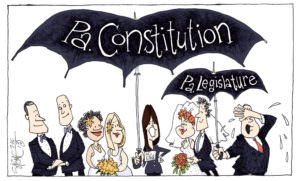A New American Rebellion
As the Supreme Court debated this week over the federal Defense of Marriage Act, Justice Antonin Scalia noted the number of states that are permitting gays and lesbians to marry. "There has been a sea change," he said, "between now and 1996." He was right about that, but it's not just gay marriage.LOS ANGELES — As the Supreme Court debated this week over the federal Defense of Marriage Act, the 17-year-old law barring same-sex marriage, Justice Antonin Scalia noted the number of states that are permitting gays and lesbians to marry. “There has been a sea change,” he said, “between now and 1996.”
He was right about that, but it’s not just gay marriage. A range of change is taking place socially, culturally, legally in the United States. Thomas Jefferson, in a 1787 letter, advocated “rebellion” every 20 years for the nation to keep up with itself. That may be too strong a word. Matt Miller, a Washington Post columnist, probably comes closer with the phrase “accelerated evolution.” Whatever word one chooses, the times they are a-changin’.I am talking not about the Internet and all that, though obviously, like Gutenberg’s press, new technology is always a game changer. I mean social and cultural changes, and soon enough legal changes — from sexual attitudes to tea party ideology. American attitudes, thinking and actions are changing faster than many of us, particularly holders of power, can easily handle.In the same week, last week, there were hints of more critical thinking than usual. Studies reported in The New York Times that more women are in colleges than men, and the number of men applying is in decline exactly as the economy is demanding more and more education and specialization. The day’s Los Angeles Times, citing different studies, showed this headline:“Women Outshine Men as Corporate Leaders; they are more likely to consider competing interests in making decisions, study finds.”That study, done jointly by American and Canadian universities, published in the International Journal of Business Governance and Ethics, was based on interviews with 600 members of corporate boards of directors — 25 percent of them female. “Our findings,” states the journal, “show that having women on boards is no longer just the right thing to do, but also the smart thing to do.” Women are less constrained by rules, reported the Times, and more likely “to use collaboration, cooperation and consensus-building.”To put that into harder numbers: Businesses with female directors are 20 percent less likely to go bankrupt.Next to its Supreme Court coverage on Thursday, The New York Times had this headline:© 2013 UNIVERSAL UCLICK
Your support matters…Independent journalism is under threat and overshadowed by heavily funded mainstream media.
You can help level the playing field. Become a member.
Your tax-deductible contribution keeps us digging beneath the headlines to give you thought-provoking, investigative reporting and analysis that unearths what's really happening- without compromise.
Give today to support our courageous, independent journalists.





You need to be a supporter to comment.
There are currently no responses to this article.
Be the first to respond.